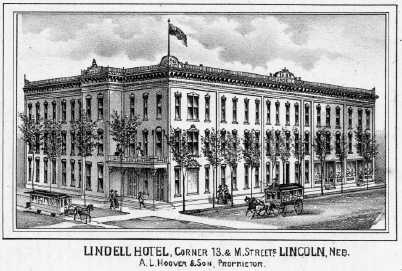
|
|
|||
Full of hope and determination young Hoover made his way through the dark and the drizzling rain three miles to the house of John Waldens, with whom he spent the next few days. In the meantime his father found him, but did not insist on his returning home, however admonishing him to he a good boy and keep in good company. Our subject, hearing of a widow lady in the neighborhood who wanted some one to chop her winter's wood, called upon her, and soon contracted to cut twenty cords at fifty cents per cord. He had in his possession a gold dollar, which he had received as a premium from the county fair for being the swiftest runner of his age, he making a run of a quarter of a mile in twenty-six seconds, and distancing thirty competitors. With this money he purchased an ax and went to fulfill his part of the contract. |
|||
|
|
|
|
|||
of Unionville, and stated to them his circumstances and his ambitions. They at once proffered him the use of their library, and all the instruction he might require for the sum of $50, he to avail himself of these as long as he desired. Dr. Russell secured him a boarding-place with A. M. Harris, a blacksmith by trade, who was indebted to the Doctor. Mr. Hoover was to pay $2 per week when the time arrived that he could do so. Four weeks later it occurred to him that he might thus contract a bill which would embarrass him in the future, so taking with him his anatomy and skeleton he went into the country to the home of his uncle, Daniel Zook, where he was received with open arms, and where he pursued his studies, going to and from the village for instruction as necessity required. As time passed on he found it necessary to be more convenient to his preceptors. They very kindly proffered him a room adjacent to their office, which he fitted up for keeping bachelor's hall. In order to do this he engaged to husk corn, for which he received three bushels per day; this he exchanged for furniture and bedding. He was soon engaged in "light housekeeping" and study, occasionally receiving a basket filled with substantial eatables from the larder of his uncle or his grandmother Zook. |
|||
|
|
|
|
|||
cellent public school system. He grew up to be energetic, strong and able, and early in life learned the trade of a butcher. In March, 1869, he ambitiously determined to try his fortunes beyond the Mississippi in the young and rapidly growing city of Lincoln, and on his arrival here he established himself in his trade, and for eight years drove a thriving business as a butcher. He then turned his attention to the management of a hotel, and opened the Peoria House, on the corner of Ninth and O streets, which building was erected in 1879. In this he was quite successful, but he has now leased the hotel for five years, and is confining his attention mostly to his livery business, which is quite extensive, and is carried on at a great pecuniary profit. In connection with this, he says that when he first commenced to run a livery stable he was but a butcher, and consequently had had little or no experience with horses, or with the business in any way, and when he started in 1881 his whole outfit consisted of a horse and spring wagon, and a small stable, 16xl8 feet, in a back alley. From this small beginning his business has grown so rapidly and to such large dimensions that he has constantly had to add to his building, and to his equipment, first erecting an addition 20x30 feet, then another 70x100, a one-story building, and later a two-story building, 55x100 feet, and he now has forty head of horses, among which are four fine, thoroughbred roadsters, which can be driven single or double, and are valued at $1,000 each. He runs two hacks and a baggage wagon, and employs a force of eight men continuously. Our subject has acquired all his property since becoming a resident of Lincoln by sheer force of energy and fine business talents. When he came here he was $35 in debt. His property is now valued at $65,000, comprising his hotel, which occupies one-fourth of a block, two fine farms, his livery stable and stock, and valuable city lots, both here and in California. |
|||
|
|
|
|
|
|
|
|
© 2000, 2001 for the NEGenWeb Project by Dick Taylor, Ted & Carole Miller

